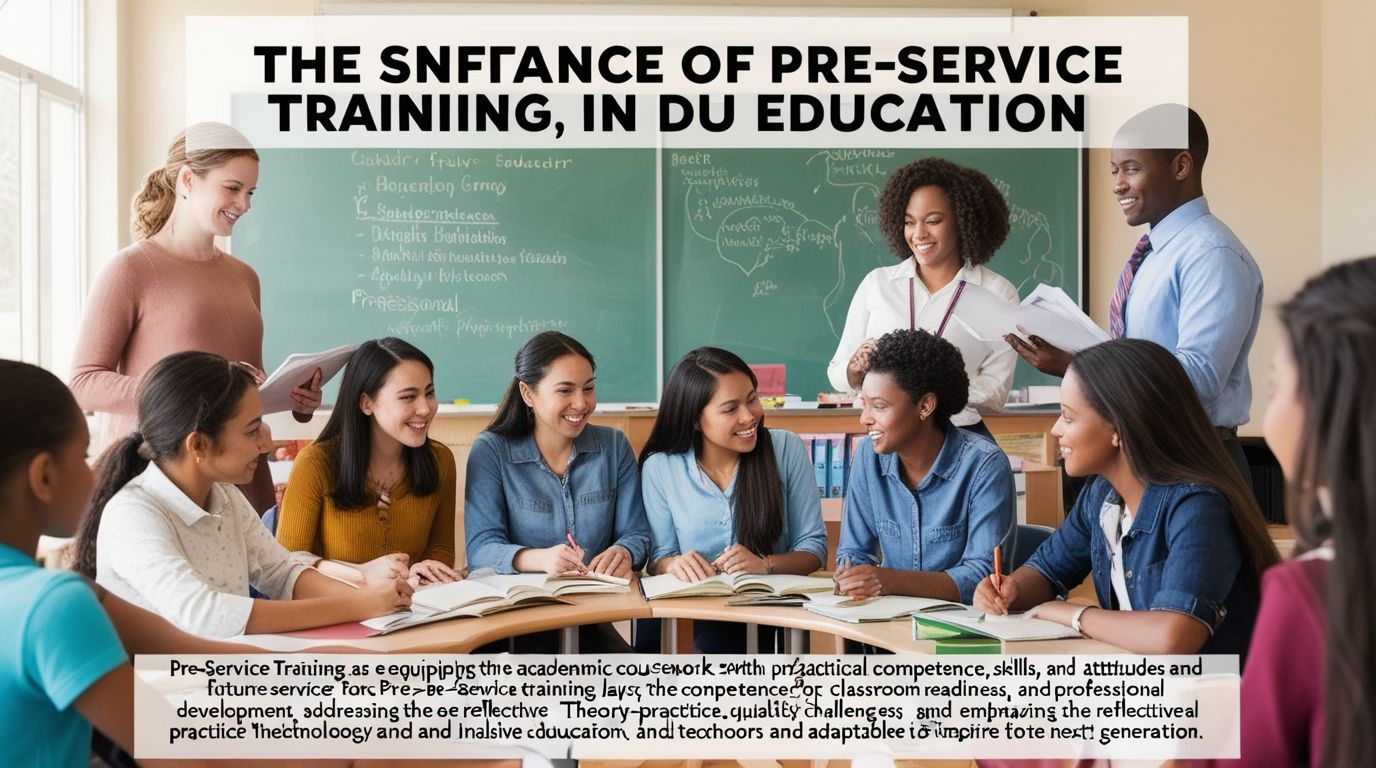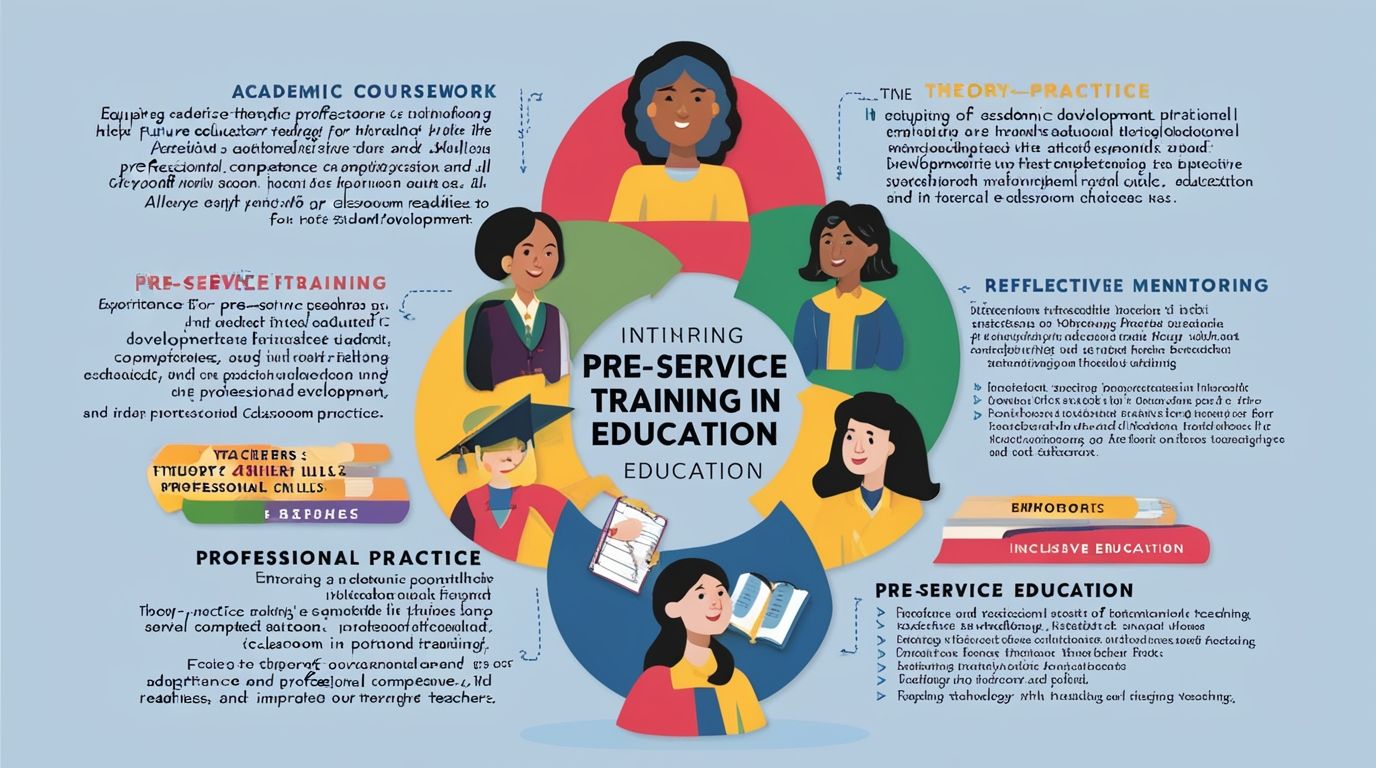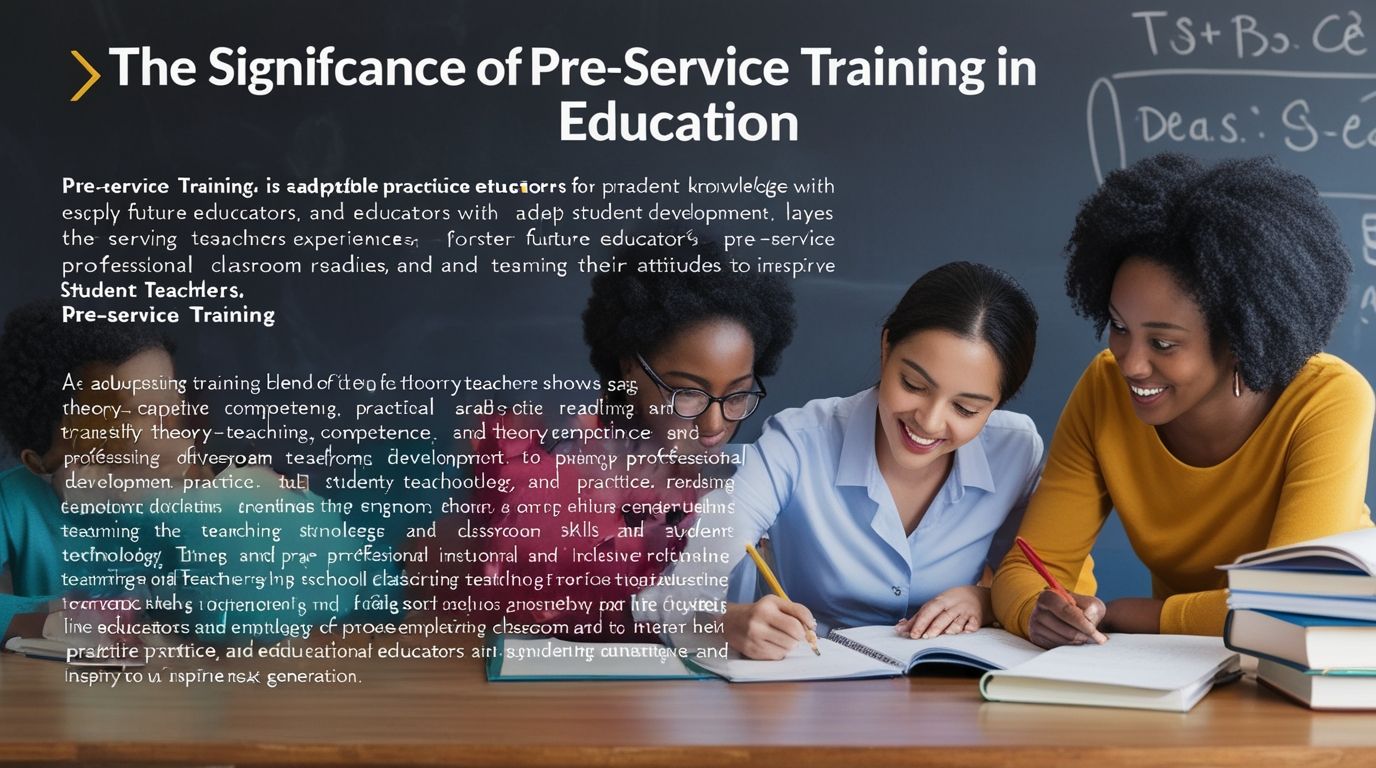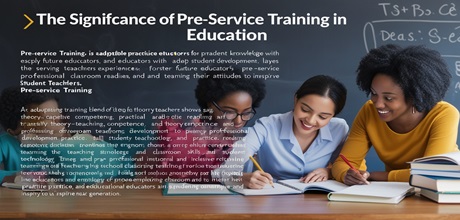Introduction
The Significance of Pre-service training in education is a critical phase in the preparation of future educators. This phase involves equipping prospective teachers with the knowledge, skills, and attitudes necessary to effectively facilitate learning and foster the holistic development of their students. Pre-service training, typically delivered through teacher education programs at universities and colleges, forms the foundation upon which the professional competence of teachers built. This article explores the various aspects of pre-service training in education, highlighting its significance, components, challenges, and potential improvements.

The Importance of Pre-Service Training
- Foundation of Professional Competence: Pre-service training serves as the cornerstone for developing professional competence among aspiring teachers. It ensures that they acquire a deep understanding of educational theories, teaching methodologies, classroom management techniques, and subject matter expertise.
- Classroom Readiness: Effective pre-service training equips future teachers with the practical skills needed for classroom management, lesson planning, and instructional delivery. This readiness is crucial for creating a conducive learning environment and addressing the diverse needs of students.
- Adaptation to Educational Changes: Education a dynamic field influenced by technological advancements, pedagogical innovations, and evolving societal needs. Pre-service training enables future teachers to adapt to these changes and incorporate new teaching strategies and technologies into their practice.
Key Components of Pre-Service Training
- Academic Coursework: Pre-service training programs typically include academic coursework in educational psychology, curriculum development, assessment methods, and subject-specific pedagogy. This theoretical foundation is essential for understanding the principles of teaching and learning.
- Practical Experience: Field experiences, such as student teaching or practicum placements, are integral to pre-service training. These experiences provide prospective teachers with hands-on opportunities to apply their theoretical knowledge in real classroom settings, under the guidance of experienced mentors.
- Professional Development: Pre-service training often includes workshops, seminars, and professional development sessions focused on contemporary educational issues, such as inclusive education, digital literacy, and cultural competency. These sessions help future teachers stay abreast of current trends and best practices in education.
- Reflective Practice: Encouraging reflective practice is a key aspect of pre-service training. Future teachers are encouraged to reflect on their teaching experiences, identify areas for improvement, and develop strategies for enhancing their instructional effectiveness.

Challenges in Pre-Service Training
- Theory-Practice Gap: One of the significant challenges in pre-service training is bridging the gap between theoretical knowledge and practical application. Ensuring that future teachers can effectively translate educational theories into classroom practices remains a persistent issue.
- Diverse Classroom Realities: Pre-service training programs must prepare future teachers to handle the diverse realities of contemporary classrooms, including varying student backgrounds, learning needs, and behavioral issues. This diversity can be challenging to address comprehensively in training programs.
- Technological Integration: Integrating technology into pre-service training programs is essential for preparing future teachers for the digital age. However, access to technology and the ability to use it effectively in teaching can vary widely among institutions.
- Mentorship Quality: The quality of mentorship during field experiences significantly impacts the effectiveness of pre-service training. Inconsistent or inadequate mentorship can hinder the development of practical teaching skills and professional growth.

Strategies for Enhancing Pre-Service Training
- Strengthening Partnerships: Building strong partnerships between teacher education programs and K-12 schools can enhance the quality of field experiences. Collaborative efforts can ensure that future teachers receive consistent and meaningful mentorship from experienced educators.
- Integrating Technology: Incorporating technology into pre-service training programs can enhance instructional delivery and classroom management skills. Providing future teachers with access to digital tools and training on their effective use is crucial for preparing them for modern classrooms.
- Emphasizing Reflective Practice: Encouraging continuous reflective practice throughout pre-service training can help future teachers develop a growth mindset. Structured reflection sessions, peer discussions, and mentorship feedback can facilitate this process.
- Promoting Inclusive Education: Pre-service training programs should emphasize inclusive education principles to prepare future teachers for diverse classrooms. This includes training on culturally responsive teaching, differentiated instruction, and strategies for supporting students with special needs.
- Ongoing Professional Development: Pre-service training should not be viewed as an endpoint but as the beginning of a continuous professional development journey. Providing future teachers with resources and opportunities for ongoing learning and growth can help them stay current with educational advancements.
Conclusion
Pre-service training in education is a vital component of the teacher preparation process. It lays the foundation for professional competence, classroom readiness, and adaptability to educational changes. Despite the challenges, effective pre-service training can be achieved through strengthened partnerships, technological integration, reflective practice, inclusive education, and ongoing professional development. By addressing these aspects, we can ensure that future teachers are well-equipped to inspire and educate the next generation of learners.

8s8fpo
ftfxj3
h329v3
Can I simply say what a aid to search out someone who truly knows what theyre talking about on the internet. You positively know easy methods to bring a problem to light and make it important. Extra folks have to read this and understand this facet of the story. I cant believe youre no more common because you positively have the gift.
fgqo0n
Thanks for sharing superb informations. Your site is so cool. I am impressed by the details that you have on this blog. It reveals how nicely you understand this subject. Bookmarked this web page, will come back for extra articles. You, my friend, ROCK! I found simply the information I already searched all over the place and simply couldn’t come across. What an ideal site.
Thank you for any other informative website. The place else may I get that kind of info written in such a perfect means? I have a project that I am simply now working on, and I’ve been on the glance out for such information.
Can I just say what a relief to find someone who actually knows what theyre talking about on the internet. You definitely know how to bring an issue to light and make it important. More people need to read this and understand this side of the story. I cant believe youre not more popular because you definitely have the gift.
Hello, Neat post. There’s a problem with your site in internet explorer, may check thisK IE still is the market chief and a huge section of people will omit your fantastic writing due to this problem.
Hey there would you mind letting me know which webhost you’re working with? I’ve loaded your blog in 3 different browsers and I must say this blog loads a lot faster then most. Can you suggest a good internet hosting provider at a reasonable price? Cheers, I appreciate it!
Very interesting details you have observed, thankyou for posting.
I regard something genuinely special in this web site.
Pretty! This was a really wonderful post. Thank you for your provided information.
Hello! I’ve been following your blog for a while now and finally got the bravery to go ahead and give you a shout out from Houston Texas! Just wanted to tell you keep up the good job!
Hey there, You have done a fantastic job. I will certainly digg it and personally recommend to my friends. I am sure they’ll be benefited from this site.
This web site is really a walk-through for all of the info you wanted about this and didn’t know who to ask. Glimpse here, and you’ll definitely discover it.
I am extremely impressed with your writing skills as well as with the layout on your weblog. Is this a paid theme or did you customize it yourself? Anyway keep up the nice quality writing, it is rare to see a great blog like this one these days..
Hello. fantastic job. I did not expect this. This is a impressive story. Thanks!
After all, what a great site and informative posts, I will upload inbound link – bookmark this web site? Regards, Reader.
I truly appreciate this post. I’ve been looking all over for this! Thank goodness I found it on Bing. You have made my day! Thx again